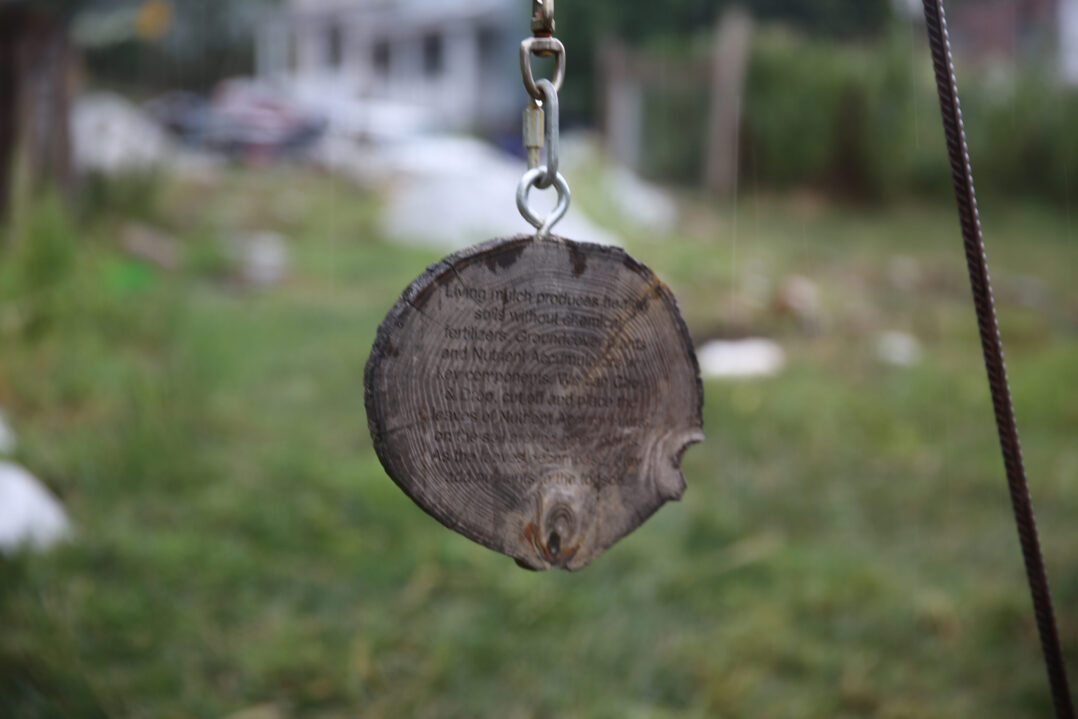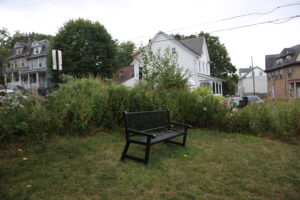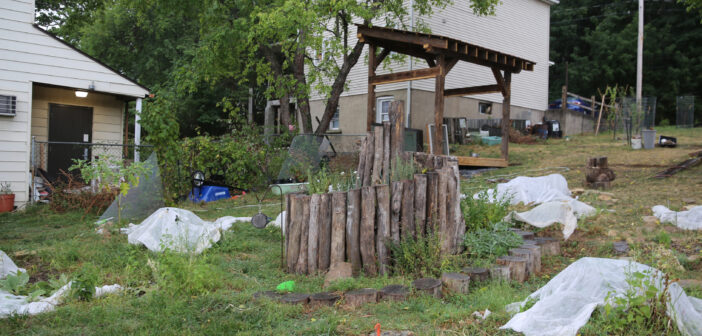The Southside Permaculture Park brings a proximal food source to the Lehigh community while engaging local residents in gardening.
“It is simply understanding that our activities on the Earth — especially in agriculture or horticulture and management of plants and animals broadly — that they all need to have an understanding of sustainability and permanency, hence ‘permaculture,’” said Albert Wurth, associate political science professor and mentor to the project.

A sign at the Southside Permaculture Park. The sign explains the park’s plant species and their growth processes. (Hongyu Liu/BW staff)
In 2018, four students living in Lehigh’s Eco House noticed an empty lot next to the building and thought a permaculture park would make good use of the land. Wurth said the students showed David Casagrande, professor of environmental anthropology and director of environmental studies, their proposal and received funding for the infrastructure of the park.
“I hadn’t even heard the word permaculture,” Casagrande said. “I have a master’s degree in ecology, and when I read the proposal I was blown away.”
The empty lot originally held campus buildings, which have since been demolished. Casagrande said the soil in the area did not support growing plants, however, with the use of fungi, the students were able to create rich soil by introducing organic materials.
This past summer, alongside lead mentor Casagrande, a cohort of students worked to develop plans for the future of the project. Maddie Watts, ‘24, a member of the cohort, said they spent time working in the garden, teaching Bethlehem community members about agriculture, making partnerships with members of the community and planning future events.
Fellow Emily Newman, ‘24, also spent this past summer working on a variety of ways to improve the Permaculture Park.
According to the project’s website, the goals for the park include beautifying the community and increasing biodiversity.
The United States Department of Agriculture considers Bethlehem a food desert.
Newman said the project serves to help combat food insecurity in Bethlehem by growing produce for the local community.
Casagrande said the park is home to a variety of plants requiring little-to-no maintenance, as well as annually selected plants. Students identify these plants based on their ability to thrive in Bethlehem’s climate.
Newman said the student fellows research the uses of native plants, some of which residents identify as weeds. Even though these plants, such as comfrey, are not purposefully planted, the students found medicinal benefits to them, such as healing burns and wounds.
Casagrande said the team has received emails from people around the world asking for advice about permaculture, including an American publisher who asked the students to review a children’s book about permaculture that was being translated from French to English.
The project has come with a few challenges, however. These include receiving certain permissions from Lehigh’s

A bench at the Southside Permaculture Park. The park is located at 232 Summit St. in Bethlehem. (Hongyu Liu/BW staff)
administration for the project, learning how to prevent animals from disrupting the garden and language barriers between students and community members.
Watts said this semester, the fellows expect to speak about permaculture at the Engagement Scholarship Consortium at the University of Georgia, translate the park’s website to Spanish and continue expanding into the community.
Lehigh students and members of the surrounding community are encouraged to visit the park and learn about its sustenance.
“It was a lot to learn all at once, but anyone can do it and anyone can be more self-sustaining,” Watts said.






Comment policy
Comments posted to The Brown and White website are reviewed by a moderator before being approved. Incendiary speech or harassing language, including comments targeted at individuals, may be deemed unacceptable and not published. Spam and other soliciting will also be declined.
The Brown and White also reserves the right to not publish entirely anonymous comments.